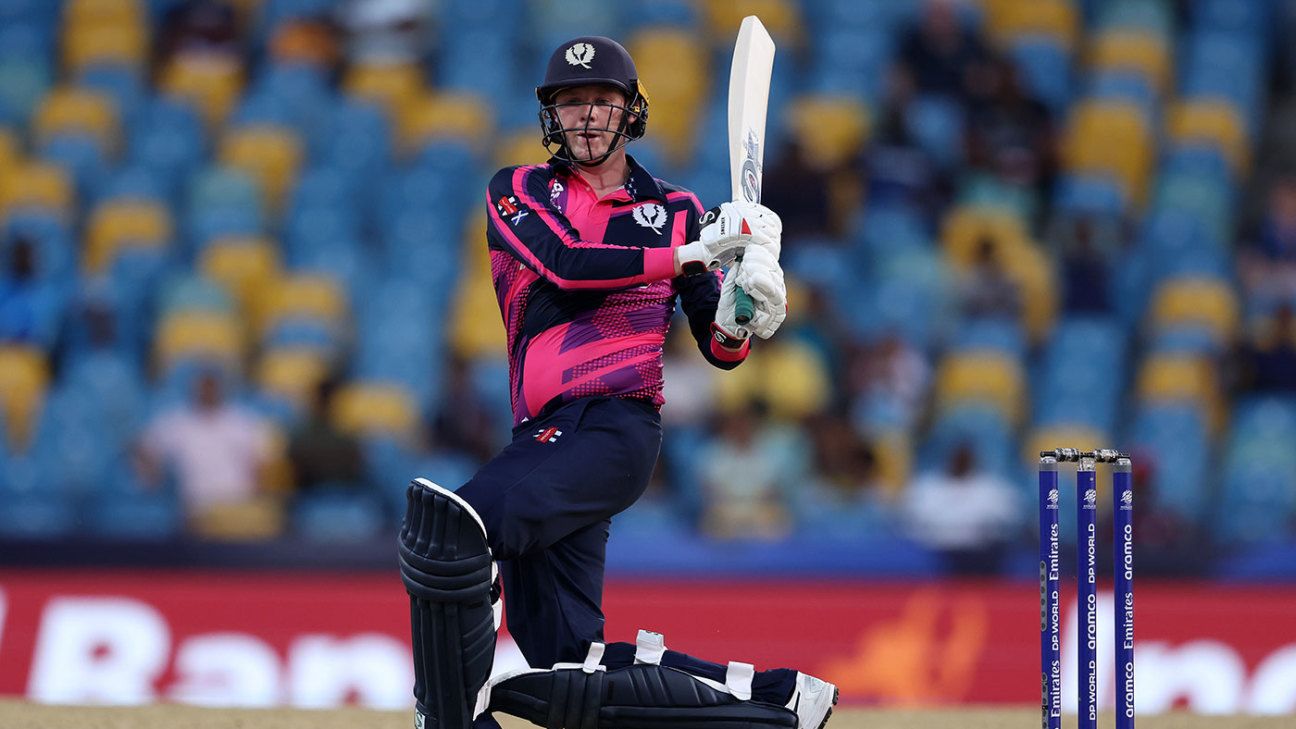Cricket
Berrington, Leask and a partnership of contrasts give Scotland hope of greater deeds

George Munsey and Michael Jones, the openers who had fearlessly faced down England’s fastest bowlers and wiliest spinners before the rains came, were back in the dressing room. Brandon McMullen soon followed.
Gerhard Erasmus and Bernard Scholtz were threatening to squeeze the life out of the chase with their right and left-arm spinning combination and, with ten overs left and 87 runs needed, the momentum was shifting Namibia’s way.
Matthew Cross attempted to up the ante after a string of dot balls and singles increased the pressure further, but a wild sweep intended to cut the rope was misdirected and he trudged off the field to join the top order as spectators after the ball clattered into his pads.
In the three times the two sides had met in T20Is, Namibia had walked away with victory. A fourth would leave Scotland’s hopes of progressing to the holy land of the Super Eights hanging by a fraying thread.
Berrington’s sweet spots are square of the wicket, leaning on the back foot and lacing the ball through point with a kind of ferocious finesse, or timing his sweeps and slog-sweeps with the precision of an atomic clock
But coming into this tournament his form was somewhat patchy. Across six innings in Scotland’s series against UAE and the tri-series with Ireland and the Netherlands he had scored 81 runs, passing 20 just once. At Kensington Oval, his captain and his country needed him to unlock the best he had.
Leask has a kinetic, frenetic energy, both on and off the field; a “hyper dafty who puts his heart on his sleeve” is how he describes himself. He’s a friendly chatterbox and a cricket badger who is, at the very least, as fiercely proud of his Scottish heritage as anyone in the squad.
You see it in the field as he attacks every ball and screams encouragement, when he’s appealing for an lbw or celebrating a wicket, a jack-in-the-box bursting with fireworks.
But the ignition spark is hard to find as he begins his partnership with Berrington and the required run rate is climbing steadily.
Berrington is Leask’s polar opposite in character and style. Scotland’s captain is measured and reserved; he speaks softly and is a shrewd observer of people and match situations alike. When he does speak, his team-mates listen and he inspires fierce loyalty among them. He’s borne the responsibility of being the most public face of cricket in Scotland through the game’s most tumultuous off-the-field turmoil and has done so with a quiet dignity.
Their contrasting personalities are epitomised by the way they bat. Leask is a v-man, his slender frame generating colossal power through a straight bat as he plunders the ball in front of the wicket. There is nothing of fancy or fuss, just the sheer bloody-minded determination to send the ball packing to another time zone.
Berrington’s sweet spots are square of the wicket, leaning on the back foot and lacing the ball through point with a kind of ferocious finesse, or timing his sweeps and slog-sweeps with the precision of an atomic clock.
In the 13th over it was Berrington who dropped the hammer and dropped to one knee, the favoured slog-sweep launching Tangeni Lunganeni’s over the deep-midwicket fence. The next ball was lofted over the covers for four and the momentum marching Namibia’s way paused and looked back over its shoulder.
What it saw was Leask, locked and loaded and always trigger-happy. The merest hint of width was all he needed to smash the shackles and the ball from Erasmus into the Bridgetown sky and over midwicket to land on the groundsman’s shed. At least it was still in the Caribbean time zone.
Light and dark, night and day, Berrington and Leask yin-and-yanged Scotland towards victory. They found gaps in their own peculiar ways and ran hard to eliminate the deadly dots.
The longest blow of the afternoon was Leask’s, of course, a 101-metre monster off Ruben Trumpelmann over wide long on. It was into the wind, it was in the stands and the crowd was in a delirious rapture.
The shiner didn’t impede the skipper’s vision as he sealed the chase with a final, emphatic, six that catapulted Scotland to the top of Group B. From there they can glimpse the knockouts on the far horizon; it will take more heroics to bring them more sharply into view.
But if ever there was inspiration to be found, a reminder that the sum is greater than its parts, Scotland can find in the deeds of their own odd couple. The classy Berrington and the mighty Leask.
Melinda Farrell is a journalist and broadcaster










